Wyndham Lewis : a Discursive Exposition. By Hugh Gordon Porteous.
(Desmond Iliumsworth. 8s. tid.) BETWEEN the earthquake of Lawrence dead and the still small voice of Mr. Eliot living, the wind of Mr. Wyndham Lewis has not had much chance lately ; it is as well that Mr. Porteous should remind us of this Enemy in our midst. Mr. Porteous in his panegyric of Mr. Lewis has kept to a " spatial plan—a sectional analysis of his various ' functions.'" Believing that the only " development " over the last twenty years has been in the direction of " larger fields of interest, with a proportionate increase in technical mastery over the new material assimilated," he has paid scant attention to chronology ; rather he has made it his business to show us the " Split-Man," the visionary, the satirist and the pam- phleteer as co-existent, and to dwell on such facets of the writer as his " quality," his imagery and style, and his humour. We have for once, in fact, a book less about the man than about the artist. It is a militant book ; enthus- iastic, crusading, proceeding by a series of explosions with their points, or flashes of light. Probably the fairest way to review it is to note the main points as they come.
Very well, then. Mr. Porteous sees in Mr. Lewis a " Split- Man " as much divided in himself as Lawrence or Mr. Joyce or Mr. Eliot ; an embodied conflict between self and not-self, between contemplation and action, between creator and society. Or we may set on one side the visionary, the " genius " ; on the other the " Enemy," the crusader—the " solitary outlaw," as Mr. Lewis himself would put it. The visionary is, of course, the artist, and the artist in touch with something beyond normal experience (though Mr. Lewis, it may be noted here, distrusts such complete surrender to dream and the unconscious as is implied in surrdalisme ; dream stuff may be used, but it must be re-ordered in the work of art). But Mr. Porteous also uses the term " vision- ary " to include, beside the man who sees visions, the man who sees things as an artist. " Mr. Lewis sees always with this painter's eye, and translates everything into that vision before further manipulating it." Mr. Joyce fuses his variegated material by means of his poet's ear ; Mr. Lewis by means of his painter's eye. The mutinous reader may be inclined now and then to question the success of the " fusion," But at least Mr. Porteous' theory explains certain oddities in the technique ; and in future when we come across such a phrase as this :
" Lowndes undulated himself as though for the passage of the large bubbles of the chain of an evor-growing chuckle."
or this : " With a flexible imbrication reminiscent of the shutter-lipped
ape, a bud lip in front of tta'gu:121Ontoanwid3gcle ho shot tthieeirliateelfe extremities Of his eyebrows sharply from their quizzing perch—only this monkey-on-a-stick mechanical pull down the face's centre "-
we can always murmur " painter's eye."
But Mr. Porteous proceeds with his flash-light show. He tells us that Mr. Lewis, in manufacturing one of the in- congruous images which mark his style, " sees a coloured shape, matches it from stock (i.e., memory) with a different object having an approximately identical colour or shape, and hands it back." He tells us that his author " dispenses with rhythm, as a decorative or lulling device, completely." He tells us that the humour is " the result of an almost fanatical detachment from the object" ; a detachment that is the direct outcome of employing his Painter's Eye even when " off duty as a painter, and importing that attitude into Life " ; that, In fact, it is a manifestation of the " Split-Man " and that its incongruity brings it near to tragedy. He tells us that the characters are puppets with " an eternal and universal quality," the more terrific for their want of humanity. And in the course of these illuminations he gives an interesting comparison between Mr. Lewis as a describer and Mrs. Woolf, Lawrence, Mr. Eliot and Mr. Joyce—whom he oddly seems to find inferior to our Enemy.
The conclusion is that Mr. Lewis stands for the objective and satirical as opposed to the subjective and romantic. But does he stand as solid for anything as Mr. Porteous makes out ? Questionable ; which does not prevent the book from
being good, glittering propaganda. DUXE1 POWELL.






































 Previous page
Previous page